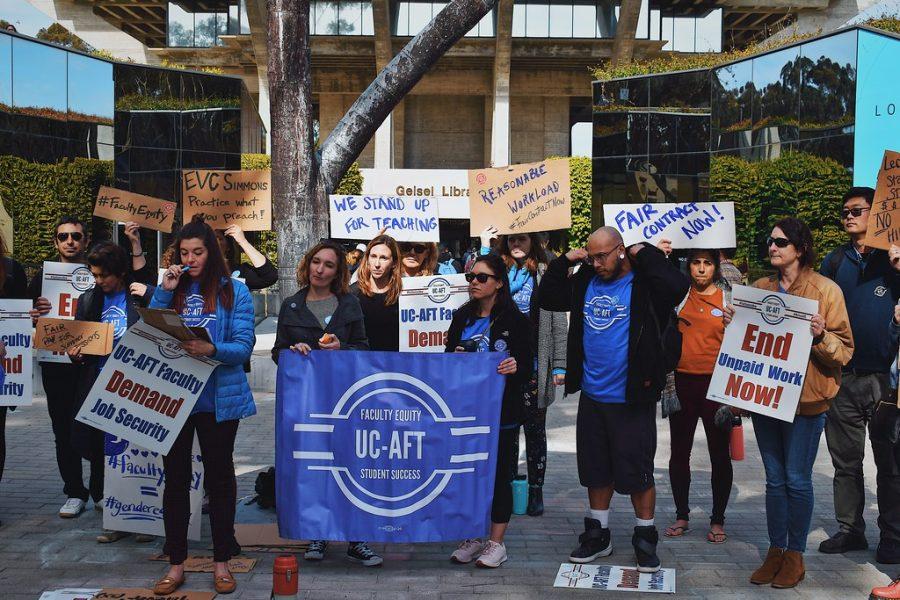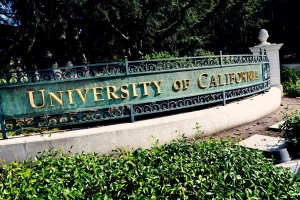UC-AFT Faculty Plan Strike Amidst 2.5-year Struggle in Demanding Sustainable Labor Contracts from UCOP
Oct 24, 2021
“Our working conditions are your learning conditions,” UC-AFT faculty lecturers at UC San Diego said. “Their flexibility is our instability.”
On Oct. 13, representatives from UC-AFT, the union that represents contingent teaching faculty across the University of California, stood with signs and informational handouts to indicate their plans for a strike. UC-AFT has been bargaining since April 2019 with the UC Office of the President for more transparent labor relations and concrete contract agreements.
UC-AFT authorized their collective ability to strike at any given moment in June 2021 — passing with a 96 percent majority vote. UC-AFT faculty lecturers are demanding more sustainable and equitable employment as job stability and salary continue to decrease each year.
So far, UCOP and UC-AFT have failed to come to an agreement in their recent bargaining sessions. Dr. Megan Strom, an instructor for the Dimensions Of Culture Program and UC-AFT Unit 18 Collective Chair, told The UCSD Guardian that the University needs to find common ground with faculty.
“If they don’t meet us in bargaining […] and we do not find that the University is meeting the needs that we have as lecturers, then we will be forced to strike,” Strom said. “We don’t want to strike, but it’s up to them.”
Contract Negotiations
The weteachuc.org website outlines the faculty lecturer’s demands and provides a comprehensive timeline of their campaign.
“Lecturers’ bargaining priorities include consistent review and rehiring processes to ensure that the UC retains its best instructors, enforceable workload standards that provide UC students with the best possible education, and fair compensation that reflects lecturers’ training, experience, and contributions to the UC,” the UC-AFT website reads.
University management has accepted a proposed 1-2-3 year contract agreement, which is similar to UC-AFT’s previous suggestions. The idea of this agreement is that a lecturer is granted a one-year contract followed by a performance review, which, if passable, would result then in a two-year contract; the performance review for the two-year contract could then garner the three-year contract.
However, the agreement contains loopholes that the UC-AFT is fighting to change. Current exceptions placed forth by management include the proposed ability to set appointment lengths to less than the accepted two or three years, which could prevent their qualifications for performance reviews.
As of now, UCSD lecturers who have yet to reach their sixth year of lecturing can only use student CAPE reviews as a metric for performance.
The opinion-based reviews can be poor measurements of instructional ability because they are reportedly often over-saturated with bigoted, ad hominem opinions, according to Dr. Briana Iatarola, a lecturer from the Communications, Environmental Studies, and Warren College Writing Program Departments.
“I have to deal with all of the bloated critiques that come through that are sexist, racist, gendered, misogynistic,” Iatarola said. “Tell me there’s not a better way to assess outcomes of your own lecturers.”
Inequitable Salaries
At the informational rally on Oct. 13, the printed handouts highlighted how University lecturers often qualify as low-income despite the recent tuition increase from the UC Board of Regents.
“[University of California] Pres. [Michael] Drake raised your tuition promising to reduce class sizes and reinvest in faculty,” the handout read. “But the lecturers who teach one-third of credit courses at UC qualify as low income in six of nine counties where UC campuses are located.”
Iatarola has been teaching at UC San Diego since 2018. In her experience, she feels that her and her colleagues’ teaching abilities are treated as a transactional tool for economic growth.
“The push for seeing universities as a site of extraction and economic growth — not intellectual development, teaching, and learning — has brought forth this very crisis […],” Iatarola said. “You extract their labor, you see how much you can get out of them, then you churn them, you push them aside, and you bring in the next robust, healthy round of Ph.D. graduates. […] Their job is seen as a supplement to some magical full-time gig they have outside of UCSD where this is supplemental income.”
UCnet stated in a release on Oct. 12 that the University highly values its lecturing faculty, which is reflected in their working conditions.
“This high regard is reflected in the fact that UC lecturers enjoy some of the best pay, benefits and working conditions in the country, and a level of employment stability that only a select few universities in the nation offer their lecturers,” the release said.
According to both Iatarola and Dr. Michael Calderón-Zaks, who has been a lecturer with the Sociology Department since 2018, contingent faculty lecturers often take home an average of $20,000 per year.
Iatarola’s annual pay/appointment cuts outweigh the set yearly 3 percent to 5 percent raises; she has been forced to triple her workload since 2018 in order to recoup that payment. The job instability also pushed her to accept a San Diego State University instructing position for this academic term.
“The University’s push for constant growth […] means that my class sizes from 2018–2020 have nearly doubled while my pay has decreased by 17 percent every year,” Iatarola said. “The longer a lecturer is here, technically, if they work with the same department, teach the same classes, the lower their annual take-home pay will be.”
When a lecturer reteaches a course, the University cuts the lecturer’s appointment time by 17 percent due to the belief that teaching the same course requires less preparation. However, Iatarola has had to remake entire course curriculums to keep her content relevant.
“The last time I taught the two courses that I’m teaching right now, specifically New Media, Youth, and Democracy [COMM 114D], I taught this course my first quarter as a lecturer in March of 2018,” Iatarola said. “This predated the George Floyd murder, this predated Black Lives Matter, revolutionary protests across the globe, so if I were to recycle any material from 2018, I’d miss an entire social movement […] That’s egregious to the student population.”
Strom expressed her frustrations with the University’s failure to live up to their claims of stand-out employee conditions, as well.
“The more time that we have to spend […] working other jobs, worrying about whether or not we’re gonna have a job next year, whether or not we’re gonna have enough money to pay our rent — that takes away time that we could be spending on course development, that we could be spending on mentorship,” Strom said.
No Clear Guidelines for Reappointment, Continuation of Employment
Strom is in her sixth year of instruction at UCSD. If a lecturer makes it to their sixth year of lecturing, then they are put up for an Excellence Review which can result in a three-year contract. According to Strom, only 10 percent of lecturers make it to their sixth year of instruction; the rest are denied reappointment.
While Strom is grateful to be one of the few who make it to their sixth year of lecturing, she wishes her colleagues were not subjected to this system.
“That’s not a place that makes me proud to work, you know, that I survived the gauntlet. We’ve lost tremendous talent from this University,” Strom said. “I would love to be able to feel proud of this institution. Right now, I don’t,” Strom continued.
Calderón-Zaks has experienced the systemic extent of this university-wide issue: he initially began lecturing at UCSD as a supplementary position to his work at Santa Monica College. He then spent Winter and Spring Quarters of 2020 instructing at UCLA, as well.
“Even though I had stellar [evaluations] from the Spring 2020 Quarter [at UCLA], they didn’t bring me back,” Calderón-Zaks said. “That’s just it — I had no right to appeal — there was no due process. […] That hurts students because if you get a professor you like, […] who you feel that your friends should experience or […] you want to take that professor for a different course, you should be able to do that.”
The lack of ability to appeal may vary in its specific terms throughout the University and across departments, Calderón-Zaks said.
“The bureaucratic structures may vary from one department to another, and they may — in the same department may even change […], but either way, we have no recourse to keep our jobs, appeal at all — even though we’ve already proven ourselves,” Calderón-Zaks said.
Iatarola expressed similar sentiments, saying that the lack of transparency in the current labor relations leaves both lecturers and students in the dark about the reappointment process.
“I talk to students, and they go, ‘Oh, [this instructor] did a phenomenal job, they’ll be here next year,’ and I said, ‘A phenomenal job does not equate to job security even when you’re a lecturer,’” Iatarola said. “Some of the most phenomenal educators are dangerous because they use the classroom as a site for critical thinking and revolution […in] chang[ing] the educational structure here.”
Calderón-Zaks said that due to internal department issues, his appointment terms in anticipation of Winter Quarter 2020 were not fully settled. As a result, he ended up collecting unemployment during that academic term.
“I thought my [Consolidated Omnibus Budget Reconciliation Act] COBRA benefits would kick in, but then because UC changed COBRA vendors in the middle of the pandemic, I ended up losing my health insurance momentarily,” Calderón-Zaks said.
Options are limited for lecturers too, as tenure-track position openings are dwindling in the United States. Iatarola referenced the state of Georgia’s recent decision to weaken tenure protections in public universities as an example.
“The reality is that, in higher ed. in general, tenure-track jobs are disappearing. [It is] the slow dismantling of the tenure system itself,” Iatarola said. “On my end, I’m asking tenured faculty and tenure-track faculty to pay very close attention to the UC Board of Regent’s eventual moves to dismantle our own tenure system here.”
To Calderón-Zaks, the informational rally in front of Geisel Library provided an opportunity for students and instructors to exchange anecdotal stories of their plights with one another. He sees parallels between student and instructor struggles, especially as the housing crisis, HDH strikes, record-breaking admission/enrollment, raised tuition, campus expansion, and the campus’s Return to Learn compound to impact both parties.
“Basically, the return to campus has been one big mess,” Calderón-Zaks said. “It’s been decided by non-educators at the top of the system who had wanted to raise tuition for some time […]. On top of that, they also added students, but no place to put them, no place to house them, or even a plan to feed them. […] They have to deal with UC’s incompetence and we have to deal with UC’s incompetence in similar kinds of ways, albeit different.”
Strom, who wrote a 2015 dissertation on student-led social movements in Uruguay, has a few suggestions for concrete actions that students can take in order to increase collective awareness and support their faculty lecturers.
Her suggestions for interested students include the following:
- Signing the pledge in favor of UC-AFT’s cause
- Showing up to UC-AFT actions and demonstrations on campus
- Talking to instructors regarding the cause — lecturers, those on the tenure-track, and tenured professors alike
- Spreading awareness
“We’re in a really encouraging place, but we’re not done yet,” Strom said. “There has been some movement on the contract, but there are still quite a lot of loopholes that mean that the current system and the current status quo could still exist. ”
“The power of student activism and student organizing is limitless,” Strom said.
At this moment in time, whether or not UC-AFT-affiliated faculty will strike is dependent upon the outcomes of bargaining sessions with UCOP. The most recent bargaining session was held on Oct. 22 over Zoom; an agreement was not reached.
This is a developing story; The UCSD Guardian will continue to report updates as more information becomes available.
Correction: This article was edited at 7:05 a.m. on Oct. 25 to clarify Calderón-Zaks’ previous instructing history.
















Emma • Oct 26, 2021 at 6:55 am
Doing business is not an easy process, and working conditions are one of the most important factors to consider. The more successful the business, the better conditions it provides you, here https://mediaonemarketing.com.sg/seo-services-singapore/ you will find everything for this